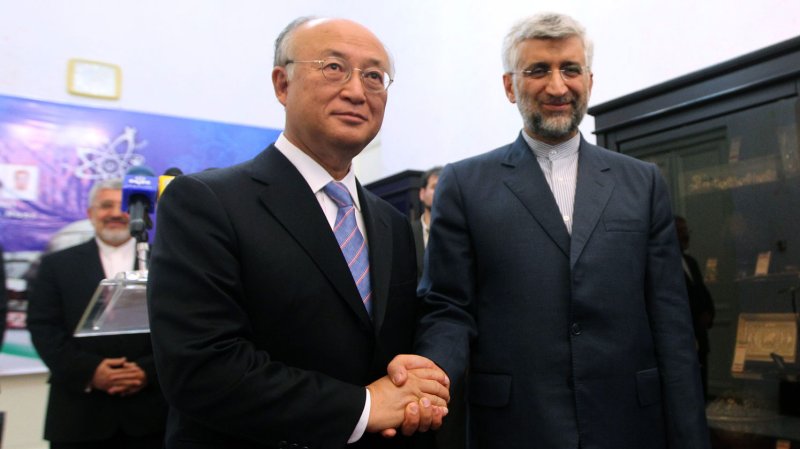1 of 3 | Iran's chief nuclear negotiator Saeed Jalili ( R) greets UN nuclear chief Yukiya Amano (L) during their official meeting on May 21, 2012 in Tehran, Iran. Amano's visit comes two days ahead of Tehran's meeting on Wednesday in Baghdad with a group of world powers, to discuss concerns over Iran's suspected nuclear weapons drive. UPI/Fars News /Hamed Jafarnejad |
License Photo
VIENNA, May 25 (UPI) -- U.N. inspectors said Friday they found uranium enriched to 27 percent at the Fordo enrichment facility near Qom, Iran.
The higher enrichment level was found in samples taken in mid-February, The New York Times reported. The inspectors revealed their findings in a report delivered to the International Atomic Energy Agency just a day after talks on Iran's nuclear program recessed in Baghdad.
The report did not make clear whether the 27 percent was a trace amount or an overall figure, the Times said.
Diplomats cautioned the spike in purity could be accidental and Iran has been asked to explain the finding.
The Times noted most uranium used to fuel reactors is enriched to 4 percent while 90 percent purity is needed for bomb-grade material.
The scheduling of a third round of talks between Iran and six world powers on the nuclear program is a sign of progress even with no breakthrough so far, the White House said Thursday.
"We did not expect in the prior two rounds breakthrough moments," White House spokesman Jay Carney said after the two-day second round of talks ended in Baghdad in an impasse.
The Wall Street Journal reported Friday the talks appeared at times close to breaking down.
"What we're looking for is progress," Carney told reporters. "We're looking for seriousness on the part of the Iranians in terms of addressing the concerns of the international community. And, thus far, those expectations have been met."
The next round of talks is to take place June 18-19 in Moscow, Western and Iranian officials said.
Catherine Ashton, the European Union's top foreign policy official and the lead negotiator for the six powers, told reporters each side improved its understanding of the other's position.
"What we have now is some common ground, and a meeting in place where we can take that further forward," she said.
"However, significant differences remain," she said.
Chief Iranian negotiator Saeed Jalili, the personal representative of supreme Iranian leader Ayatollah Ali Khamenei, described the talks as positive and echoed Ashton's remarks about remaining differences.
He told reporters a key obstacle was the refusal by the United States, Russia, China, Britain, France and Germany to accept Iran's claimed right to enrich its own nuclear fuel, which it continues to do despite four U.N. Security Council resolutions demanding it stop.















